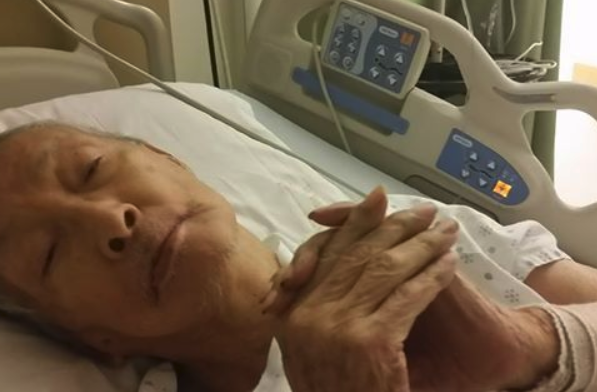by Carolyn Ayon Lee. This article was originally published by Honolulu Civil Beat.
Were it not for Hawaii’s Pidgin English, I doubt my Grandma and I, her first grandchild, could’ve understood each other, she knowing very little English, and I, an ignoramus about her mother language, Korean.
Love can help build bridges, but for a meeting of the hearts and minds, one needs a basic common vocabulary.
Pidgin comes into play when I communicate with my father, David, whose native language is Korean. Actually, Dad is fluent in Japanese and can handle Mandarin Chinese, too. Nope, none of these Asian languages is familiar to me. I know far more Spanish and German, even Latin, than the language of my ancestors.
I learned two songs in Korean from my Grandma when I was little.
The other night at the hospital, Dad and I sang “Arirang.” He was last a patient at this same hospital in Hilo some 60 years ago.

David Lee, Carolyn Ayon Lee’s father.
The hospital environment can be unsettling, even distressing, for our kupuna, or family elders. That’s why singing “Arirang” was a way of soothing my father, who was born in Korea 91 years ago, with one of the most beloved Korean folk songs.
Thanks to Pidgin, my Grandma, who came to the Big Island from a tiny fishing village in Korea as a “picture bride” at 17 years old at the turn of the 20th century, earned enough to support her and Grandpa’s family of eight children.
Making Kimchee
The Kim family raised vegetables, pigs and chickens that were offered for sale at the local market. Grandma took in laundry for the U.S. military, and her children wove lauhala into placemats and potholders that were sold at a friend’s shop.
Eventually, my grandparents embarked on a kimchee-manufacturing business, known as Keaau Kim Chee, then later, Harry Kim’s Kim Chee, taking its name from the youngest in the family of five girls and three boys. My Mom, Soonie, the oldest, was away in Honolulu at the University of Hawaii, Manoa campus, but the rest of the children, worked on the lauhala: Frank, Diane, Meng, Helen, Hasun, Bogart and Harry. Harry is now the three-term mayor of the Big Island.
Mom told me that she started school midway through the first-grade year, knowing some Korean and some Pidgin, which were spoken in the Kim household.
At Keaau Elementary School, the teacher made Mom stand on one foot in the corner because she didn’t understand enough English to do her lessons. Mom recounted to me, in a matter-of-fact tone, these early years of school that surely brought her much pain. School was a two-mile walk each way.
Eventually, Mom caught on and caught up, and by the time she reached the ninth grade, she was the top female student at Keaau.
So it’s no surprise that in the Lee household, my mother spoke impeccable English. No, she didn’t speak Pidgin with us.
A Familiar Tune
But to me, Pidgin English’s musical cadences are comforting in the same way that Dad relaxes upon hearing a familiar tune from childhood.
Pidgin is inextricably tied, in my mind, to my beloved Grandma and my Dad, forging eternal bonds linking one generation to another.
A childhood memory: One evening, a neighbor seemed to be intoxicated, walking unsteadily. He also was irritated with me because he could hear me asking Grandma if he was drunk.
Grandma stood her ground, telling the man, “Wassamada you?” (What’s the matter with you?) That was so brave of my grandmother. Fortunately, another neighbor intervened and defused the situation.
Sometimes, when I am feeling scared, I think back to that moment when Grandma fearlessly spoke up in defending me, “Wassamada you?”
So, wassamada me?
I am proud that I am descended from my Grandma, my Grandpa, my Mom and my Dad, and I hope to live up to their legacy.
Click here to watch a video of Carolyn singing “Arirang” with her father.
The opinions expressed in this article are those of the author and do not necessarily reflect those of the Diverse Elders Coalition.

